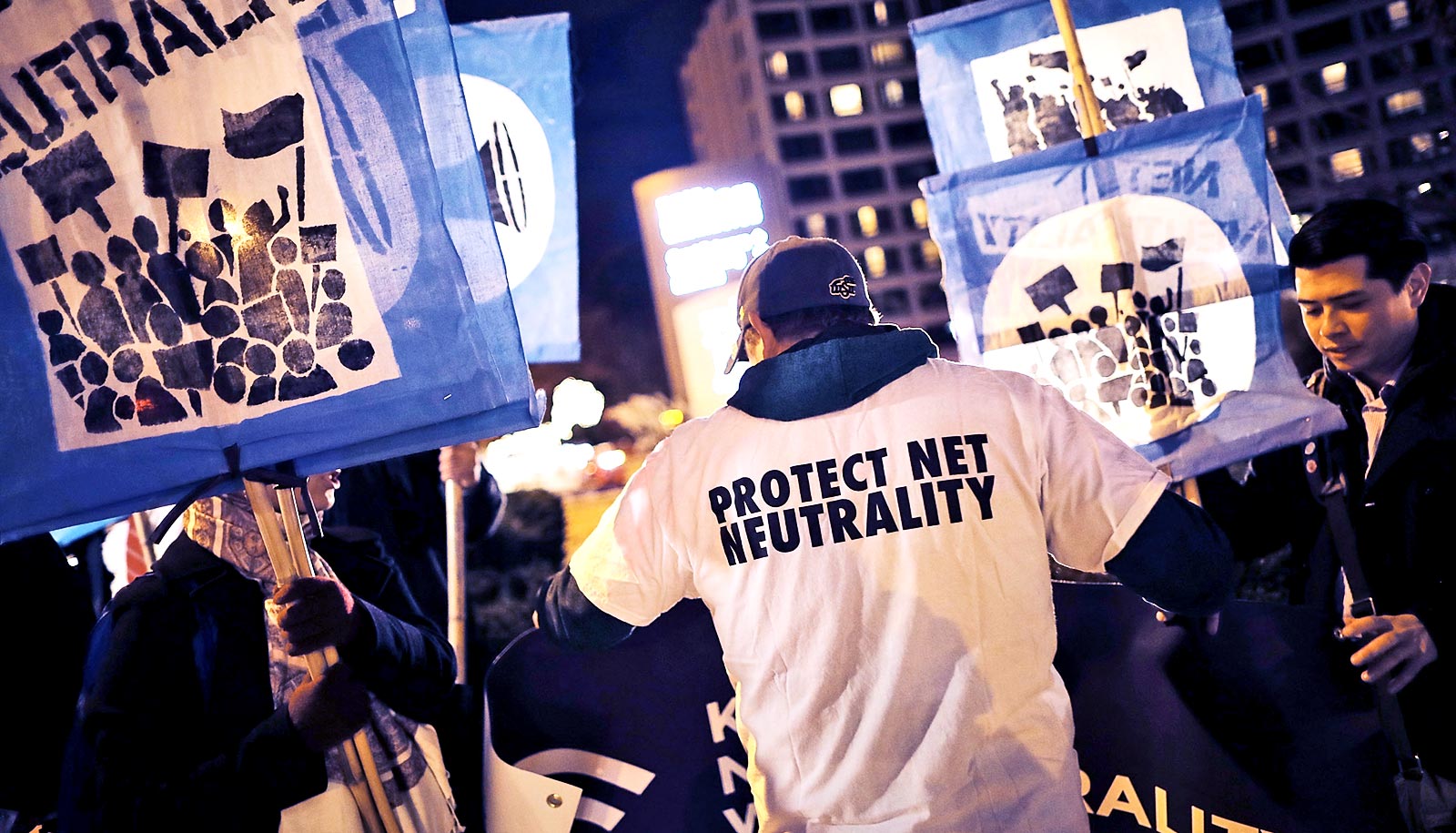On December 14, 2017, the Federal Communications Commission (FCC) voted to repeal its net neutrality rules, which critics say could make the internet more expensive and less accessible for Americans.
Here, net neutrality experts Ryan Singel from the Stanford University Law School and Didi Kuo from the university’s Freeman Spogli Institute for International Studies discuss what this means for Americans and for internet freedom.
What is net neutrality?
Singel: Net neutrality is a simple principle that Americans or people around the world are the ones who choose what websites they get to go to, what apps they get to use, what services they get to use, and neither their internet service providers (ISPs)—the companies they pay to get online like Comcast, Verizon, and AT&T—nor the government gets to affect those decisions.
What does the repeal do?
Singel: The order eliminates all net neutrality protections. That means that ISPs can now charge sites and services to load for an ISP’s subscribers, create fast lanes that only deep-pocketed companies and speakers can afford, and block sites based on their content. This is a radical step by the FCC.
“I like to think of it as the internet is going to get more boring.”
Since its inception, the US internet has operated under net neutrality principles. Users have always had the expectation that they could use whatever sites and apps they’ve wanted. And for decades, the FCC has taken action to make sure that is possible. This repeal of net neutrality not only gets rid of the existing rules, it prevents the FCC from putting rules into effect, even if the ISPs start acting poorly.
How does the repeal prevent the FCC from putting rules into effect?
Singel: In 2015, the courts ruled that the only way the FCC can adopt meaningful net neutrality protections is if it decides that broadband providers are common carriers. So the FCC declared ISPs to be common carriers and the 2015 rules withstood challenges from ISPs in court.
FCC Chairman Ajit Pai undid that classification, categorizing broadband providers as information services. With this classification, there is no legal foundation for the FCC to do anything as simple as saying ISPs must let Americans go to any legal website they want.
For the average American, what will the real-world effects of this ruling be?
Singel: The effects we’re likely to see will affect users secondarily. Verizon, for instance, can now go to a Yelp or a Netflix and say, “You need to pay us X amount of money per month, so your content loads for Verizon subscribers.” And there’s no other way for Netflix to get to Verizon subscribers except through Verizon, so they’ll be forced to pay. That cost will then get pushed onto people that subscribe to Netflix.
So what users do online will become more expensive, we’ll see fewer free things, and thus the internet will become more consolidated. Websites, blogs, and startups that don’t have the money to pay won’t survive. I like to think of it as the internet is going to get more boring.
Kuo: The worst-case scenario would be if ISPs blocked access to websites based on their content, but that scenario seems unlikely outside of a few limited applications, such as file-sharing. The ISPs have an interest in being apolitical and letting the internet remain “open,” at least in the ways that will be most apparent to consumers.
More likely, the rollback of net neutrality will have consequences for start-ups and companies with a web presence. It will allow ISPs to charge companies more to reach consumers. While large technology platforms can afford to pay for fast access, start-ups and competitors will have a far more difficult time.
Is this ruling likely to make the internet less democratic?
Kuo: It is unlikely that the repeal of net neutrality will lead to outright censorship of certain websites or content. Americans will still enjoy much more internet freedom than citizens in other countries that actively control access to specific websites or control speech online.
Citizens might have differential access to the internet: some websites will load slowly and be harder to access. Americans already pay more for broadband access—and at slower speeds—than citizens in other advanced industrial democracies because of our noncompetitive broadband market. The repeal of net neutrality is therefore a problem for democracy because of issues with monopoly and regulatory capture.
How will the ruling affect monopoly and regulatory capture?
Kuo: Rolling back net neutrality allows ISPs freer reign to engage in rent-seeking and anti-competitive behavior, which hurts consumers. There is very little competition in the broadband market, particularly for truly high-speed internet access. Recent reports from the FCC indicate that at least half of consumers have no high-speed access, and households with access may only have one provider.
“The battle is far from over, and if it’s something you feel strongly about, call your Congressperson.”
ISPs are some of the most despised corporations in America in surveys of customer service and consumer satisfaction. The lack of broadband competition makes it impossible for consumers to switch providers, and the rollback of net neutrality makes it even harder for new companies to enter the broadband market.
The problem of monopoly is closely tied to poor regulation, since the FCC has historically needed to intervene in markets such as radio and television in order to create more competition. The ISPs are already part of large media conglomerates that own broadband access and content. Comcast, for example, owns NBCUniversal; Verizon owns AOL and Yahoo; AT&T is attempting to buy Time Warner. The rollback of net neutrality allows ISPs to direct consumers to content that they own, accelerating trends of agglomeration in the media industry.
Some opponents have said that they will take the decision to court or propose legislation to restore net neutrality rules. Do you think either is likely to make a difference?
Singel: These kinds of decisions are always met with lawsuits. I think there’s ample grounds for opponents to have these rules overturned. From a process standpoint, getting to these rules ignored a lot of public input. On the content side, there is a question of whether or not the FCC has the ability to reclassify ISPs from common carriers to information services.
So far there is a growing movement by net neutrality supporters to use a special legislative tactic known as the Congressional Review Act (CRA) to undo the FCC vote. This would immediately restore the 2015 protections. By contrast, all of the legislative proposals that have been floated so far are very weak proposals that aren’t actually net neutrality. These efforts are supported by ISPs to permanently eliminate net neutrality protections.
What can people do if they want to change net neutrality rules?
Singel: Even though the FCC made clear that they didn’t care what the public thought about this issue, elected representatives do. Calls to Congress as well as talking about this with friends and on social networks are really powerful.
The battle is far from over, and if it’s something you feel strongly about, call your Congressperson. The calls matter, and this issue is not finished.
Faculty views expressed here do not necessarily represent those of the Freeman Spogli Institute for International Studies or Stanford University, both of which are nonpartisan institutions.
Source: Nicole Feldman for Stanford University



